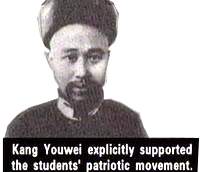 |
|
Songs of Youth (1)
Echoes of the May 4th Movement |
| CCTV.COM 2002-11-25 14:11:19 |
|
Tian'anmen literally means the Gate of Heavenly Peace. Formerly known as Chengtianmen or the Gate That Bears Heaven, it was built in 1417. It served as the front gate of the Forbidden City during the Ming and Qing dynasties. After the founding of the Republic of China, Tian'anmen was opened to the public. From a site where imperial edicts were issued, it was turned into a place where the public expressed their opinions. Tian'anmen became a political symbol in the eyes of the Chinese.
The political protest that broke out here on May 4, 1919 opened a new era.
 In an article published three weeks later, Luo Jialun, one of the students' leaders of Beijing University, described the event as the May 4th Movement. In an article published three weeks later, Luo Jialun, one of the students' leaders of Beijing University, described the event as the May 4th Movement.
The May 4th Movement spread rapidly across the country. More than 170 mass organizations in Tianjin formed the National Salvation Alliance.
In April 1919, 21-year-old Zhou Enlai returned to China from Japan. Soon afterwards he became an organizer of the students' movement in Tianjin.
In Nanjing, students from Jinling Women's University joined the demonstrators. Founded four years before, the university trained the first group of women students in China.
On the night of May 5, a bell rang furiously, disturbing the tranquillity of the campus of Fudan Public School. Students took to the streets to support those in Beijing. On June 3, all the people of Shanghai were angered by the news that the police and soldiers arrested several thousand students in Beijing when they were demonstrating. Workers, shopkeepers and students in Shanghai went on strike. People from all walks of life joined the ranks of protesters.
The centre of the May 4th Movement shifted from Beijing to Shanghai. A unique political force came into being in the city with thousands upon thousands of industrial workers. The labour movement surged forward in the following years, bringing forth the Communist Party of China, the political party of the working class.
Sun Yat-sen was engaged in writing at home in Shanghai. He followed the patriotic movement going on around him. He was aware that a new force was taking shape. He made a speech on June 17, highly appraising the May 4th Movement. He said that unity was strength. When he received students' representatives, he said: "The future and destiny of China will be put on the shoulders of you young people of the present generation."
 Under the great pressure of the people of the whole country, Xu Shichang, President of the Republic, decided to give up pawns to save a castle. Under the great pressure of the people of the whole country, Xu Shichang, President of the Republic, decided to give up pawns to save a castle.
On June 10, he ordered the removal of Cao Rulin, Zhang Zongxiang and Lu Zongyu from office, trying to appease the anger of the people.
In Paris, June 28th was the deadline for signing the peace treaty at the Paris Peace Conference. Complying with the Chinese people's will, Gu Weijun, a young Chinese diplomat, and his colleagues refused to attend the signing ceremony to express the Chinese people's indignation.
Many years later, scenes of that morning remained fresh in Gu Weijun's memory: "My car moved slowly early in the morning. I felt everything was gloomy. The colour of the sky, the shades of trees and the quiet streets were so gloomy. I thought the day would remain in Chinese history as a tragic day." The action set a precedent of daring to struggle in the history of modern Chinese diplomacy.
The Red Building of Beijing University was the starting point on the way to the square. It is a witness to the stirring year.
Students who came out of here began their different choices of life. Luo Jialun, Kang Baiqing and three others left together to study in the United States. They were called jokingly "five ministers going abroad". Zhang Guotao went southward to Shanghai and took part in the founding of the Communist Party of China. Deng Zhongxia played a role in organizing the labour movement.
At the end of 1919, Xu Deheng took a French ocean liner bound for Marseilles to begin his work-study program.
|
|
Editor: Inner Wu CCTV.com
|
|
|
|
|
|
 |









